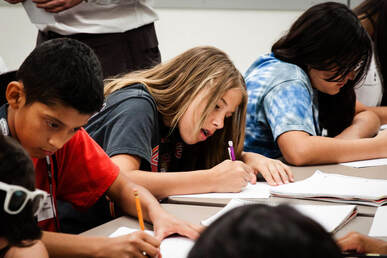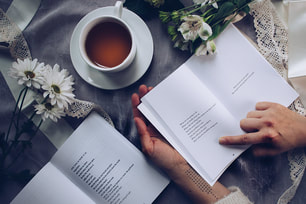 Photo by Bruce Matsunaga Photo by Bruce Matsunaga by Caitlin Hertzberg As early as I can remember, I’ve always been a writer. I’d always been gifted diaries throughout my childhood, swirling gel pen tips to doodle hearts in the margins near the names of boys I crushed on, spilling the ink of my secrets onto lavender-scented paper. I would steal phrases from overheard conversations and work them into melodies that tortured me from inside my head (I still do this). One of my earliest memories of being a writer is from 4th grade, ripping out sheets from a 99-cent spiral notebook and begging my grandmother to “staple it good” down the middle so that I can write stories like Judy Blume and Jerry Spinelli. Notice I make no mention of writing in school: The kind of writing with strict sentence and paragraph minimums, about topics I couldn’t care about no matter how hard I tried. The kind of writing that you work on for weeks on end in the overheated computer lab, revising, revising, revising, memorizing the teacher-provided rubric until every word of your assignment sounds like an owner’s manual for a VCR.
0 Comments
by Aleksandr Chebotarev
by Connor Buckmaster  Photo by Joseph Chan on Unsplash Photo by Joseph Chan on Unsplash For decades now, the study and practice of writing has been on a revolutionary roller coaster. Leaps in pedagogy surrounding college composition classes, translanguaging, and collaborative learning have changed the way college students today learn and produce writing. At the same time, the (dated) values of Standard American English, the five paragraph essay, and the thesis statement are still upheld in many pockets of American public schools. We wonder why Americans struggle to write, and there seems to be a host of answers: an inability to construct sentences, a fundamentally bad approach in teaching how to read, and a school culture which rewards surface learning and quick responses, viewing texts as inert information rather than an argument. The more and more we look, America seems to be in a literacy crisis.  by Amanda Spadel I didn’t always enjoy reading poetry the way I do now. There was a point in time when all I was interested in reading was fiction novels--especially when I first started having an interest in reading stories as a kid. Series such as Goosebumps, A Series of Unfortunate Events, and Harry Potter intrigued my initial interest in reading fiction for young adults—particularly suspense and science fiction stories. But in recent years, I’ve become a frequent poetry reader too. Actually, I’ve decided that poetry holds the same meaningful impact that longer stories do, if not more. In my opinion, the meaning in poetry can hold even more weight to young readers, especially if they don’t already avidly read. I’m not talking about introducing more traditional poems to young readers and have them relive the high school torment of figuring out a Shakespearean sonnet. Young readers should read more contemporary poetry because it’s current, most likely more relevant to their lives, and more importantly, a lot of contemporary poems seem more personal and transferable to audiences in today’s world where we are all pressed for time. by Jenna Burke Recently there has been a face that is making the internet 🔥 with extensive debate behind its actual meaning. No, it is not one of the Kardashians or Clint Eastwood memes, but rather an emoji that is causing controversy. According to USA Today, the new “Woozy Face Emoji” that is supposed to depict someone who is intoxicated has been creating critical debate in the social media universe. While some people 😂 at this and make tweets such as “this is how every one be when they get their pictures at the DMV,” others find the fact that we are having the discussion not only 😕, but also a complete waste of time.
|
Archives
July 2024
Categories
All
|
|
Glassworks is a publication of Rowan University's Master of Arts in Writing 260 Victoria Street • Glassboro, New Jersey 08028 [email protected] |
All Content on this Site (c) 2024 Glassworks
|


 RSS Feed
RSS Feed
